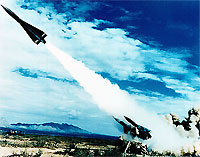US State Dept. Urges Russia to Cooperate on Missile Defense
RIA Novosti - 7.4.12 - JRL 2012-120
WASHINGTON, July 4 (RIA Novosti) - The U.S. State Department has called on Russia to cooperate on European missile defense to become assured that the defense shield will not harm its deterrent.

"Close cooperation between Russia and the United States and NATO is the best and most enduring way for Russia to gain the assurance that European missile defenses cannot and will not undermine its strategic deterrent," Frank A. Rose, Deputy Assistant Secretary, Bureau of Arms Control, Verification and Compliance, said on Tuesday.
"Russia is not being asked to blindly trust us. Through cooperation, Russia would see firsthand that this system is designed for the ballistic missile threat from outside the Euro-Atlantic area, and that NATO missile defense systems will not undermine Russia's strategic nuclear deterrent capabilities," Rose said at the 8th International Conference on Missile Defense in Paris.
"Cooperation would send a strong message to proliferators that the United States, NATO, and Russia are working together to counter their efforts," he said.
Russia and NATO agreed to cooperate on the so-called European missile defense system at the Lisbon summit in November 2010. NATO insists there should be two independent systems that exchange information, while Russia favors a joint system with full-scale interoperability.
Russia has retained staunch opposition to the planned deployment of U.S. missile defense systems near its borders, claiming they would be a security threat. NATO and the United States insist that the shield would defend NATO members against missiles from North Korea and Iran and would not be directed at Russia.
"Russia has raised the issue of wanting a legal guarantee with a set of 'military-technical criteria' that could, in effect, create limitations on our ability to develop and deploy future missile defense systems against regional ballistic missile threats such as those presented by Iran and North Korea," Rose said.
"We have made it clear that we cannot and will not accept limitations on our ability to defend ourselves, our allies, and our partners," he said.
Moscow insists it should receive legal guarantees from Washington that its European missile defense shield will not target Russia's strategic nuclear forces.
Russia's military and political leaders have repeatedly warned their western partners that if talks fail, Moscow may take a series of measures including deployment of Iskander short-range nuclear-capable ballistic missiles in the Kaliningrad exclave.
However, Rose said, the United States is willing to "agree to a political framework for cooperation that includes a statement that our missile defenses are not oriented toward Russia."
Keywords: Russia, Media, Internet - Russian News - Russia
WASHINGTON, July 4 (RIA Novosti)-The U.S. State Department has called on Russia to cooperate on European missile defense to become assured that the defense shield will not harm its deterrent.

"Close cooperation between Russia and the United States and NATO is the best and most enduring way for Russia to gain the assurance that European missile defenses cannot and will not undermine its strategic deterrent," Frank A. Rose, Deputy Assistant Secretary, Bureau of Arms Control, Verification and Compliance, said on Tuesday.
"Russia is not being asked to blindly trust us. Through cooperation, Russia would see firsthand that this system is designed for the ballistic missile threat from outside the Euro-Atlantic area, and that NATO missile defense systems will not undermine Russia's strategic nuclear deterrent capabilities," Rose said at the 8th International Conference on Missile Defense in Paris.
"Cooperation would send a strong message to proliferators that the United States, NATO, and Russia are working together to counter their efforts," he said.
Russia and NATO agreed to cooperate on the so-called European missile defense system at the Lisbon summit in November 2010. NATO insists there should be two independent systems that exchange information, while Russia favors a joint system with full-scale interoperability.
Russia has retained staunch opposition to the planned deployment of U.S. missile defense systems near its borders, claiming they would be a security threat. NATO and the United States insist that the shield would defend NATO members against missiles from North Korea and Iran and would not be directed at Russia.
"Russia has raised the issue of wanting a legal guarantee with a set of 'military-technical criteria' that could, in effect, create limitations on our ability to develop and deploy future missile defense systems against regional ballistic missile threats such as those presented by Iran and North Korea," Rose said.
"We have made it clear that we cannot and will not accept limitations on our ability to defend ourselves, our allies, and our partners," he said.
Moscow insists it should receive legal guarantees from Washington that its European missile defense shield will not target Russia's strategic nuclear forces.
Russia's military and political leaders have repeatedly warned their western partners that if talks fail, Moscow may take a series of measures including deployment of Iskander short-range nuclear-capable ballistic missiles in the Kaliningrad exclave.
However, Rose said, the United States is willing to "agree to a political framework for cooperation that includes a statement that our missile defenses are not oriented toward Russia."